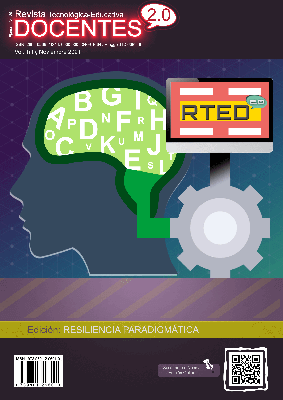Theoretical Considerations about Digital Empowerment and Sustainable Development of the Business Sector in Colombia
 DOI:
https://doi.org/10.37843/rted.v1i1.267
DOI:
https://doi.org/10.37843/rted.v1i1.267
Main Article Content
Abstract
The upswing that technologies have reached is influencing the entire panorama of people's productivity and social work. All this from an economic and scientific development perspective, promoting a range of opportunities to transform social and productive dynamism, in other words, from an economic conception. Hence, this study's objectives were to establish a theoretical conception about digital empowerment and the sustainable development of the business sector. Likewise, it was oriented to determine the relationship between digital empowerment and the sustainable development of Colombia's business sector. Therefore, it was established in a positivist methodology, typified as analytical - descriptive, and correlational; the sample consisted of 32 university teachers and 22 students who have ventured into the labor sector. The information was collected through a structured questionnaire with multiple response alternatives. The results showed regarding the first objective that the conception of digital empowerment is weak, assumed as the use of ICT. Regarding the second objective, a correlation of 0.763 was evidenced at a significance level of 0.033, indicating a high and statistically significant relationship between the variables.
Downloads
Metrics
Article Details

This work is licensed under a Creative Commons Attribution-NonCommercial-NoDerivatives 4.0 International License.
Those authors who have publications in our journal accept the following terms:
- When a work is accepted for publication, the author retains rights of reproduction, distribution of his/her article for exploitation in all countries of the world in the format provided by our magazine and any other magnetic medium, optical, and digital.
- Authors will retain their copyright and guarantee the journal the right first to publish their work, which will be simultaneously subject to the Creative Commons Acknowledgment License (Attribution-NonCommercial-NoDerivatives 4.0 International (CC BY-NC-ND 4.0)). That allows third parties to copy and redistribute the material in any medium or format, under the following conditions: Acknowledgment - You must properly acknowledge authorship, provide a link to the license, and indicate if any changes have been made. You may do so in any reasonable way, but not in a way that suggests you have the licensor's endorsement or receive it for your use. NonCommercial - You may not use the material for a commercial purpose. NoDerivatives - If you remix, transform, or build from the material, you cannot broadcast the modified material. There are no additional restrictions - You cannot apply legal terms or technological measures that legally restrict you from doing what the license allows.
- Authors may adopt other non-exclusive license agreements to distribute the published version of the work (e.g., deposit it in an institutional archive or publish it in a monographic volume) provided that the initial publication in this journal is indicated.
- Authors are allowed and recommended to disseminate their work through the Internet (e.g., in institutional telematic archives, repositories, libraries, or their website), producing exciting exchanges and increasing the published work's citations.
- Request of withdrawal an article has to be done in writing by the author to the Editor, becoming effective after a written response from the Editor. For this purpose, the author or authors will send correspondence via e-mail: [email protected].
- The author will not receive financial compensation for the publication of his work.
- All Docentes 2.0 Journal publications are under the Open Journal System (OJS) platform at: https://ojs.docentes20.com/.
References
Almenara-Cabero, J., & Romero-Tena, R. (2010). Diseño y producción de TIC para la formación. Editorial UOC.
Carruyo, N., Ureña, Y.C. & Quiñones, E. (2017). Digital empowerment: integration university, business and public policy for endogenous development. 16.
Cruz-Rodríguez, E. C. (2019). Importancia del manejo de competencias tecnológicas en las prácticas docentes de la Universidad Nacional Experimental de la Seguridad (UNES). Revista Educación 43(1). https://www.redalyc.org/journal/440/44057415013/html/. DOI: https://doi.org/10.15517/revedu.v43i1.27120
Gargallo-Castel, A., & Pérez-Sanz, J. (2009). El papel de las tecnologías de la información y la comunicación en las empresas de economía social, 28.
Garza-Mercado, A. (2007). Manual de técnicas de investigación para estudiantes de ciencias sociales y humanidades. Séptima edición. El colegio de México. https://books.google.co.ve/books?id=jdaQtk8RK2sC&pg=PA18&dq=investigacion+analitica&hl=es-419&sa=X&ved=2ahUKEwjUiJiKz5zzAhWBlWoFHTGEAkgQ6AF6BAgIEAI#v=onepage&q=investigacion%20analitica&f=false
Heras-Montoya, V., Roa-Rivera, R.I & Espinosa-Pulido, A. (2015). Las competencias digitales de futuros docentes y su relación con los estándares internacionales en TIC. Revista Iberoamericana de Producción Académica y Gestión Educativa. https://www.pag.org.mx/index.php/PAG/article/view/275
Jiménez-Pitre, I.A, Martelo-Gómez, R.J. Chiquillo-Rodelo, J. Lloreda-Gracia, D.J. & Morales-Camacho, M.S. (2017). Estrategias para el empoderamiento digital y la integración de universidades con sectores clave para la sociedad colombiana. Revista Lasallista de investigación 14(1),112-25. https://doi.org/10.22507/rli.v14n1a10 DOI: https://doi.org/10.22507/rli.v14n1a10
Méndez, A. & Astudillo, M. (2008). La investigación en la era de la información. Guía para realizar la bibliografía y fichas de trabajo. http://www.economia.unam.mx/academia/inae/pdf/inae1/u1l5.pdf
Morales-Morales, E. (2016). Empoderamiento y transformación de las relaciones de poder. Un análisis crítico de los procesos institucionales de participación ciudadana. https://www.tdx.cat/bitstream/handle/10803/400078/emm1de1.pdf?sequence=1
Mochi, P. (2012). Programas para la inclusión digital y la concertación de actores en procesos de desarrollo territorial, 37.
Rodríguez-Pérez, M. A.; Acuña-Martínez, J. A., Rojas-Vera, L. R., Lobato, L. A. (2015). Linking State, University And Business In Nicaragua. journal of Human Sciences, 21.
Plan Nacional de Tecnologías de la Información y las Comunicaciones (2008). Todos los colombianos conectados, todos los colombianos informados. https://eduteka.icesi.edu.co/pdfdir/ColombiaPlanNacionalTIC.pdf
Tamayo y Tamayo, M. (2009). El proceso de la investigación científica incluye evaluación y administración de proyectos de investigación. Limusa.
Unesco (2008). Estándares de Competencias en TIC para Docentes http://www.unesco.org/new/fileadmin/MULTIMEDIA/FIELD/Santiago/pdf/Competencias-estandares-TIC.pdf






